Charlie Chaplin's Childhood Journal
Chaplin was not known for his impeccable education. In fact, he received very little education as a child and could not read or write. Below is a journal in which the drawings are that of young Charlie Chaplin. Although he could not write, Chaplin still expressed his feelings with his plain drawings. Years later, the older Charlie Chaplin found this little journal that he used to have. Looking at pictures he had drawn from his childhood, he wanted to fill in the details that were associated with the doodles so that the journal would be complete for him to keep. Years after his death a fragment of this journal was found with his personal possessions and is now here for you to read.
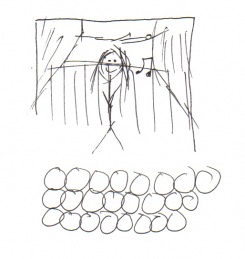
1894. Theatre was my love even from my earliest days. I practically ate, slept, and breathed theatre with both my mother and my father having a career in it. I never saw my father in my early ages; however, my mother was most definitely the biggest impact in my life during these times. She even influenced my views of my father, as she often called him a drunkard, but the interesting thing is that she never spoke of him with bitterness. This left him a mysterious figure in my life for quite some time. My mother performed on stage every night. Always with an elegant dress and a delicate air about her, she left the house for the theatre while my brother and I were left as kings of the house. Of course, when she returned she was tired and almost always bribed me and Sydney with candy to keep quiet. This was not something we complained about and fulfilled our end of the deal willingly. Whenever mother had time she would talk to us of many things, but the bulk of this talk would be of life in the theatre. The very prospect of being on stage and entertaining people captivated me from the very instant she started talking to us of it. Many children want to be a variety of mundane things, including a firefighter or a policeman, or even a taxi driver. Or even distant dreams of being a superhero or even a villain. Most of these are merely childish fantasies, but from the ripe age of five years old I knew what I wanted to be. I wanted to act, to entertain, to make people laugh, to be all that my mother was and more. What was possibly the most decisive moment of my life came due to my mother’s misfortune. She battled with a bout of laryngitis and I was chosen to replace her in one of her acts; after that first appearance on stage when I had the entire audience in an uproar with my antics, this goal in my life was clear.
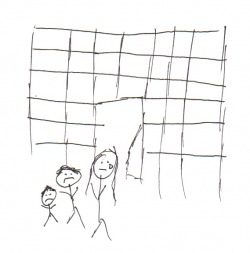
1896. This place was horrible. Nobody would forget the cold feel of this establishment that God forgot. Due to mother losing her voice, our financial status went downhill quickly, and we had to work in the Lambeth Workhouse. I remember the admissions process quite clearly. I did not mind the degradation of having my curly hair cut to shreds and replacing my tattered clothes with that of the workhouse uniform. I did not mind the perilous thought of living in poverty and having to work tirelessly throughout my childhood just so we could survive as a family. Even at that young of an age none of that affected my mentality, I was as strong as ever. Then there came the one turning point after which I couldn’t resist and succumbed to my inner desire to simply break down and weep. They took my mother away from me. At the time it seemed as if I could bear any burden in the world except for having my mother torn from me. My brother Sydney was some company, but it wasn’t the same without the comforting, ever-present company of my mother. Those days along with my inadequate schooling on the dreary campus of the Hanwell Schools for Orphans and Destitute Children can only be described as a living hell. I remember very little from that time in my life other than the complete uselessness of the impoverished institute as well as how it felt to be truly alone. It’s unfathomable how to describe being completely alone at the tender age of six, as Sydney and I were separated from each other as well as he chose to join the Navy rather than stay in this horrid place. The only thought driving me forward at that point is that I would someday be reunited with my mother, which I thought of as a given. Sure enough, mother came through for both me and Sydney and terminated our contracts with the Lambeth Workhouse. I couldn’t have been happier to be out of that place for good, even if we had to live in the streets. The one thing I remember feeling is that I was just happy to be united with both my mother and Sydney again.
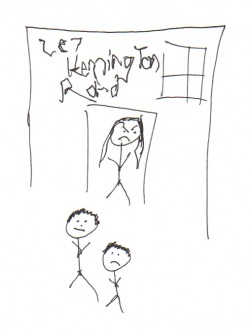
1897. -sigh-. My childhood really was one tragedy after another. When I found out my mother went insane, it was intolerable to me. How could she do this to me and Sydney? How could she relieve herself of all her debts in the world and desert me? These misgivings aside, I understood that I would have to fend for myself and however unfortunate this was, this incident opened up yet another door in my life. This door led to my father’s house, where he had remarried and found himself a new love, Louise. Although she was loved by my father, she was despised by me, and I’m sure the feeling was mutual. Despite the fact Louise was there, I was ecstatic to finally get to actually get to know my father. I had all sorts of hopes and aspirations walking into that house. Immediately, they were crushed. Louise was an uncaring host, to say the least. It was evident that her only motivation to keep me was due to her obligation to my father. My hopes of meeting my father and getting to know him were dashed as well, since he was never home. Thus, I never knew my father. Nor did I show much emotion when he died of alcoholism and dropsy a few years after this. I even profited from his death, selling narcissus flowers to various people, telling them my father had recently died. I feel ashamed of the fact I did that now, understanding that he was not a malevolent man and had good intentions. My various shenanigans outside the house kept me occupied during this period, keeping me both out of the house and out of Louise’s hair. She grew so accustomed to it that sometimes she didn’t even let me and Sydney in the house at all. Many nights were spent on the streets, huddling against the sidewalk for warmth. My father was not there to spare me and Sydney this fate, and it truly was a relief when our mother was healthy again and able to take care of us.
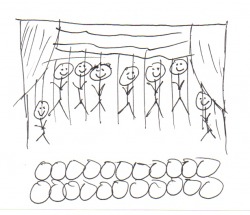
1897. Oh yes, I remember this day very clearly. It was my first real taste of the entertainment industry, and definitely not my last. My father got me this job since he knew the man that ran the troupe, Mr. Jackson, and probably thought I could provide some financial income for Mother and Sydney. The Eight Lancashire Lads were quite a success, and once I got my theatre legs I was up there acting like a pro, if I do say so myself. The audience was laughing constantly and the one act that was an absolute hit was my scene in the kitchen with Marceline, who was the big shot back then. What secretly made me happy was that the audience laughed more at my improvised acts than Marceline’s scripted performance. It gave me a sense of importance for once in my life, something that I had never been able to achieve before. Practically living off charity on the streets, it’s not often that you get an opportunity to be the center of attention like this. I loved it. Being on stage is everything I had imagined it to be. We went from town to town, performing at different theatres for different audiences and it was great. Every time we had a positive response and the audience was in hysterics by the time we were finished with our routine. Coming from a life of poverty, this is definitely a highlight of my childhood. It is also what inspired me to continue to work in theatre and acting in the years to come. I may have taken on many odd jobs just to make a living at first, but acting is where my heart was.
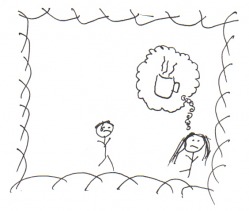
1898. “Of course, if only you had given me a cup of tea that afternoon, I would have been all right.” It was all my fault. I was the one that drove my mother to the very edges of insanity and jeopardized the future of the family. I was the one that sent her to that horrible, dreary padded room. I was the one who transformed her exuberant, vibrant face into one of dull misery. That’s all I could think of the few days after my mother went into the asylum for the third or fourth time. I couldn’t believe that my own mother, whom I loved and cherished above all else, would accuse me of such a thing. It was demoralizing to me and that one statement was so powerful that it horrified me for days to come. The impact was so immense that I even remember her exact words today, as well as her expression. She looked to me almost helplessly and was trying to call to me for help, but I just did not know what to do or say. I walked out with Sydney and wept on the way home.
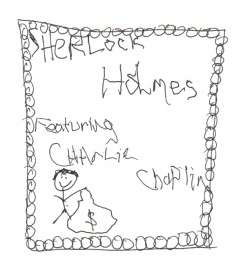
1902. Finally, my first real breakthrough. I was chosen to play Billie the page-boy in Sherlock Holmes. It was unbelievable; I was given a role in one of the most prominent plays at the time. To add to that, I was being paid more money in one week than I usually lived on in three months. It was definitely like a dream come true, I was doing what I loved and making money, what could be better? It seemed like my life had turned upside down—I was living in poverty one day and living quite comfortably the next. It was an amazing feeling and I felt like I was a new man in this world with my own importance—that I could actually do something instead of being a downtrodden little kid all the time. This role meant a lot to me because of all these things, but also because I knew how much this would mean to mother. She struggled to support both me and Sydney and now I could finally repay her for all that she has done for us. I truly feel that this was a major transition in my life, from my childhood into something more. Not quite my teenage years yet, but this was an event that transformed my life, definitely for the better.
